Microsoft Dynamics 365 CRM also has three main features that bundle their offerings. Microsoft’s Dynamics 365 CRM is available in two basic versions: for SMEs and big enterprises. Thanks to the SaaS model, Dynamics 365 guarantees flexible, fast and cost-effective deployment based on all the latest Microsoft technologies. What is interesting about Microsoft Dynamics is that it can store data in the Cloud and locally. What allows you to strengthen the security of your data. Microsoft Dynamics 365 CRM is suitable for businesses in all industries. CRM 365 demonstrates expertise particularly in the field of industry, its CRM applications serve customers in the areas of retail, health, manufacturing, government and financial services, among others.
The three key components of Microsoft Dynamics 365 CRM are:
- Dynamics 365 for create microsoft relationship sales
- Dynamics 365 for customer service
- Dynamics 365 for Retail
The additional modules that Microsoft offers are:
- Field Service – an app to manage employees and workflows in the field
- Microsoft Social Engagement – social media management and social listening application (included with sales and customer service at no additional cost)
- Project Service Automation – project-based business management for resource planning and automation
- Microsoft Relationship Sales – a sales browser integrated with LinkedIn data
What is Salesforce?
Salesforce is a software publisher created in 1999 and based in San Francisco in the United States. If its specialty concerns customer relationship management software, it distributes management software based on the Internet and hosts business applications internationally. More than 150,000 businesses of all sizes are growing their business with Salesforce. Salesforce has a dozen individual products, or Cloud that can be deployed alone or as part of an integrated environment. Companies can choose which of these Clouds to implement in their business based on their needs. Moreover, companies have the choice to supplement these functionalities with additional modules. These modules cover all the key functionalities of the CRM software (see table above).
The three key components of Salesforce CRM are:
- The sales cloud
- The cloud service
- cloud marketing
Additional modules include:
- CPQ – a price management service
- Commerce Cloud Digital – an e-commerce platform
- For sale – Service for salesforce automation of marketing
- DMP – a data management platform
- Community Cloud – a self-service portal builder
- Einstein – an AI-based analytics service
[Related Article: Salesforce Alternatives]
Microsoft Dynamics VS Salesforce Alternatives
CRM has become a part of the arsenal of many companies. For some time, Salesforce has positioned itself as a market giant, in 2021 it alone held 20% of the CRM market share, according to a Gartner report published in June 2019.
Many users believe that Salesforce is the best CRM on the market. However, it is sometimes necessary to be objective, and it is not because Salesforce has held the best place for a very long time that the other competitors of CRM are mediocre. Quite the contrary! More and more CRMs are gaining power and notoriety. That is the case of Dynamic 365, which is growing in power and gaining the trust of its users. Companies are interested in comparing and analyzing them to find the CMR that best suits them. Anyway, smaller businesses may consider alternatives such as
Are you lost in your choices? Do not panic, in any case, these two CRMs are very powerful and reliable. But you will have to choose. At FindMyCRM we want to make it easy for you and make the process as easy as possible, so we compared them both. Indeed, it is necessary to choose the CMR best suited to your company so that it can perform at its maximum. That is why important to be well informed.
Salesforce vs. Microsoft Dynamics – Pricing and Cost Review
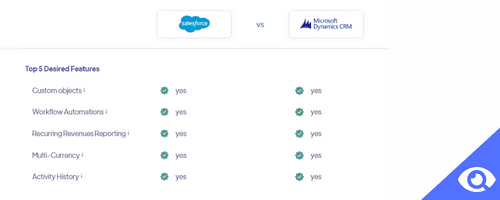
Pricing models
Probably, the cost matter is one of the essential points while choosing the solution you are going to use. So, compare CRM pricing to run your Microsoft Dynamics to Salesforce migration surely.
Microsoft Dynamics CRM
- Dynamics 365 Plan – from $210 user/month – all applications use is available.
- Unified Operations Plan – from $190 user/month – applications use that help to connect and manage the business operations.
- Customer Engagement Plan – $115 user/month – applications use to build and approve customer relationships.
- Additional users:
- Full User – from $40 per user/month – full access to application functionality.
- Team Members – from $5 per user/month – execute necessary processes and light tasks.
- Additional applications and offers use – $40 – $170 user/month
Salesforce pricing
- SalesforceIQ CRM Starter – $25/user/month (billed annually) – excellent startup idea for up to 5 users that includes all basic sales & marketing features.
- Lightning Professional – $75/user/month (billed annually) – includes all the CRM features (e. g., campaigns, permissions, customizable dashboards) for any size team.
- Lightning Enterprise – $150/user/month (billed annually) – the most popular edition for full-scale business management business offers workflow automation and custom apps.
- Lightning Unlimited – $300/user/month (billed annually) – the way to accelerate performance – unlimited customizations and access to the Salesforce apps.
Similarities between Salesforce and Microsoft Dynamics
The right choice of a CRM is essential within a company, whether small, medium or large, the CRM must be adapted. CRM was invented to improve the relationship with customers so you can focus on the rest. It is important to become familiar with its features, choose them, and know what specific CRM capabilities your team needs. Here is the list of similar features to have in both CRM:
- Shared inbox
- Live chat
- Quotations & commercial proposals
- Electronic signature
- Sales automation
- Lead scoring
- Automatic sales forecasts
- Creation of team objectives
- Mobile application
Integrations
- Email Inbox
- Outlook
- Zapier
- Marketplace of third party applications
Differences between Microsoft Dynamics vs. Salesforce
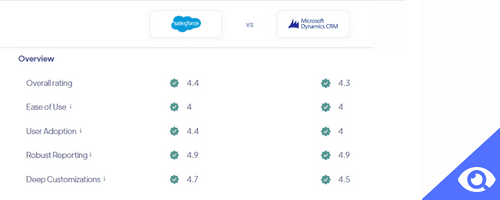
THE ADVANTAGES OF SALESFORCE
- Many features, add-ons, and integrations make CRM ideal for large businesses with diverse and evolving needs.
- Perennial Salesforce product and company due to its presence in the market and its reputation with its customers and partners. (High customer satisfaction)
- Salesforce crm vs Microsoft Dynamics is a powerful, customizable and fast product
- A lot of management done in-house, which allows adaptation to its efficient customers and focused on their expectations.
- Salesforce is Cloud Leader.
- An efficient training network.
- A mature, ready-to-use Salesforce cloud and Pardot marketing service
- Robust e-commerce facilities that are improving day by day thanks to the Demandware e-platform.
- Salesforce provides the ability to track the correct lead information in real-time. (Precise and qualitative)
- The most complete of CRM tools.
- An open ecosystem thanks to its large community of experts and partners who are constantly working on the development of applications of all types. That makes it possible to push the solutions available to customers ever further. Thanks to the AppExchange store, it is possible to offer solutions to the community or benefit from their creativity.
- Use of BI (Business Intelligence) for its clients.
- A shared infrastructure that facilitates innovation and customization of Salesforce to the delight of its partners
- Salesforce starts very quickly (in just a few days), it requires no software to install. Neither material.
THE DISADVANTAGES OF SALESFORCE
- Fairly high prices . Salesforce vs Dynamics 365 offers various prices, Dynamics 365 is more competitive!
- Great possibility of customization but great complexity, sometimes hiring a Salesforce developer is necessary for more complex customizations. (Cost increase).
- Requires real questioning upstream in terms of desired customizations before choosing Salesforce to find out if it is the best solution.
- Complex platform that requires time to adapt. Increased time spent determining the platform which takes time away from productivity. Difficulty adapting = waste of time getting used to the platform.
- It mostly requires additional external applications which are not free.
- Salesforce’s unlimited offer is limited to 1000 emails/day.
- Slight weakness in the interface.
DYNAMICS 365 BENEFITS
- CRM 365 has strong decision-making tools, including Power BI and Cortana Intelligence.
- Dynamics 365 uses a universal web language that allows Java, .NET, and HTML customization. That will allow you to work hard and create addons that truly suit your needs without slowing down the system.
- Competitive and flexible price. Cost effective and accessible to small businesses.
- Modern Dynamics 365 has native integration with LinkedIn that helps identify leads and help build relationships through personalized engagement.
- The Dynamics 365 CRM benefits from seamless integration with other Microsoft products such as Office 365, Outlook and the powerful Business Intelligence of Microsoft Power BI . Synchronizations between platforms help improve productivity.
- Secure Microsoft cloud technology.
- Ability to store data in the Cloud but also locally.
- Fast and economical implementation.
- High mobility : PC/tablet/smartphone/Mac.
- Systematically up-to-date software and service.
- Complete integration of Microsoft Dynamics ERP and CRM.
- A CRM that is constantly evolving and that continues to grow and convince its users.
- Ability to run multi-channel campaigns and determine campaign ROI.
THE DISADVANTAGES OF DYNAMICS 365
- With Dynamics 365, users will have to overcome some initial challenges once Dynamics 365 for Marketing is released. = due to its young presence on the market.
- Microsoft Dynamics templates cannot be used with Microsoft Word mail merges. They are also only available with the CRM Custom Email Utility, an add-on.
- Lots of features that incur additional costs.
- Getting started is sometimes difficult for some people.
- No synthetic view of customers.
Microsoft Dynamics CRM vs. Salesforce Ease of Use and User Accessibility
Usage by the business size
Microsoft Dynamics CRM Salesforce- freelancers,
– small/midsize business,
– enterprises, the solution is friendly to all-sized businesses with a primary focus on the enterprises
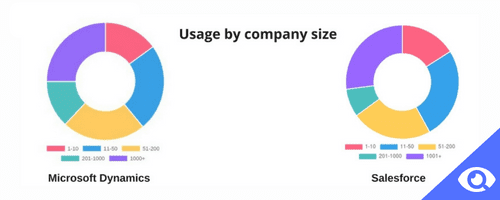
Key features
Microsoft Dynamics CRMSalesforce- unlimited application troubleshooting
– data migration tools
– proactive response to alerts
– port and network device monitoring
– backup and recovery- API
– Activity Dashboard
– Automatic Reminders
– Contact Database
– Email Templates
– Mobile Integration
– Reporting & Statistics
– Sales Reporting
– Social Media Integration
Integration possibilities
Supports integrations with the following business systems and applications:
Microsoft Dynamics CRMSalesforce- Microsoft OneNote
– Microsoft Outlook
– Microsoft Office 365
– MailChimp
– Skype
– Sales Navigator
– Total integrations: 230
– MailChimp
– Third-party apps at Salesforce AppExchange
– Gmail
– Zapier
– Zendesk
– Constant Contact
– Total integrations: 695
Usage by Country
Both solutions are used all over the world.
Microsoft Dynamics CRM Salesforce Europe, Asia, Australia, Canada, China, Germany, India, Japan, Latin America, Middle-East and Africa, United Kingdom, United States.Europe, Asia, Australia, Canada, China, Germany, India, Latin America, Mexico, Middle-East and Africa, United Kingdom, United States
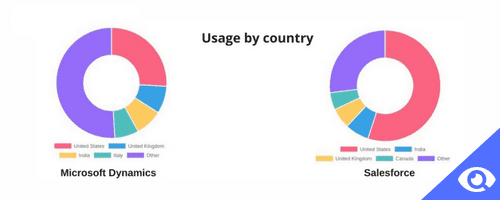
User’s support
Microsoft Dynamics CRMSalesforce- Phone
– Ticket- Phone
– Training
Supported languages
Microsoft Dynamics CRMSalesforceEnglish, Arabic, Chinese (Simplified), Chinese (Traditional), Danish, Dutch, Finnish, French, German, Hebrew, Italian, Japanese, Korean, Norwegian, Polish, Portuguese, Russian, Spanish, Swedish, Turkish, English, French, German, Italian, Russian, Spanish, Swedish
Device support (where CRM can be used)
Microsoft Dynamics CRMSalesforce- Mac
– Android
– Windows
– Web-based- Mac
– Android
– Windows
– Web-based
– Linux
– iPhone/iPad
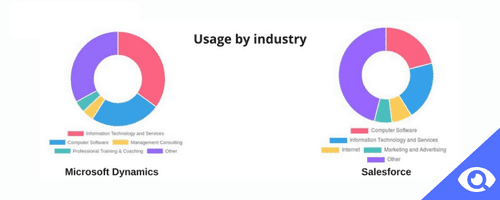
In conclusion, it should be noted that Salesforce is the most well-known marketplace CRM solution. It can help your business to sell more, close deals, and grow faster.
To learn more about above-mentioned platforms you are welcome to visit Microsoft Dynamics 365 vs Salesforce comparison from Customer Service Review
Salesforce vs. Microsoft Dynamics Customer Service Review
Salesforce Customer Service
Salesforce provides access to support groups known as ‘success communities’ and technical resources. We can cooperate directly with other Salesforce customers, get assisted by online training, and enter self-service portals. 24-hour support is available at an additional 20% of the net subscription charges.
Microsoft Dynamics 365 Customer Service
The basic plan propose support as soon as you purchase a subscription with unlimited access to technical resources, support groups, and the community. For additional access to professional experts, you can buy an additional monthly subscription for $9. Anything more than that comes under the ‘Unified Support Plan’ for which pricing is available upon request.
How to Migrate Microsoft Dynamics to Salesforce?
It is worth to choose the way you want to proceed your data migration to make this task lightweight and troubleshooting.
Therefore, take a look at the several approaches to solve this issue:
1.Conduct migration by your own.
You can visit various websites and try to perform data migration with the tutorial videos. This solution is cheap or free of charge at all. But, it may take a lot of time and make your data import a labor-consuming process.
2. Use automatic Microsoft Dynamics to Salesforce data migration tool
This is a most suitable decision that can help you to migrate data as fast as possible and avoid doing this complicated and time-consuming task manually. So, it is worth to pay attention to Trujay service and run Microsoft Dynamics to Salesforce data migration.
Why Should You Migrate With Trujay
Trujay is an automatic data migration SaaS that can enrich your business with the following benefits:
- possibility to make the data transfer between various CRM platforms;
- move the desired info from files into the chosen solution;
- migrate your data in an automated way and avoid time waste and human mistakes;
- switch info quickly, smoothly and securely;
- transfer data without your business operations delay;
- make lightweight info migration in a few steps.
Thus, make a simple step and let Trujay team implement your Microsoft Dynamics to Salesforce migration.
4 Steps for Your Microsoft Dynamics to Salesforce Migration
Step 1. Go to Migration page and log into your existing Trujay account or register the new one in one of these ways:
- fill in your credentials;
- log in via social network accounts;
- enter as a Salesforce user.
Step 2. Open the drop-down list and choose Microsoft Dynamics CRM. Fill your platform’s URL, Email/Username, and Password.
Then press the “Continue” button.
Your following step is to:
- Click on the drop-down list and choose Salesforce.
- Push ”Authorize” button and confirm your will to connect Salesforce.
- Login to your Salesforce account (enter Username and Password and push “Log in”).
Step 3. Now, perform your data mapping (choose fields and users you wish to migrate) and run a free Demo Migration.
Step 4. Check out the results of your Demo Migration.
- Start your Microsoft Dynamics to Salesforce migration in case you are satisfied with the Demo results.
- Otherwise, feel free to Trujay expert’s call and get helpful insights.
Final Statements
As you can see, both the above-mentioned platforms are great and worth paying attention to. Therefore, it can be a doubtful task to choose one of them for your successful business run. However, hope this article can help you to select the platform that will suit your business best and the way for an easy and smooth migration to it.
As well, feel free to run Microsoft Dynamics to Salesforce Demo Migration and switch a part of the actual data into the chosen platform as many times as you need.
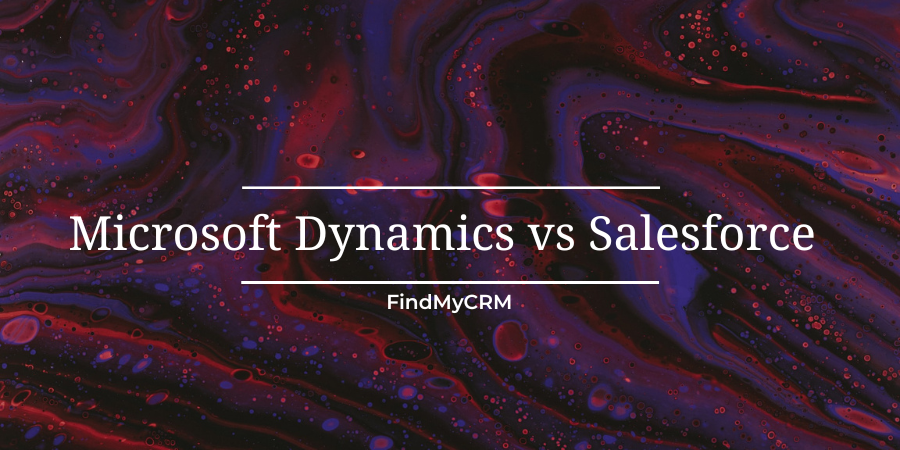
.png?width=140&height=140&name=Noah%20(1000%20x%201000%20px).png)



